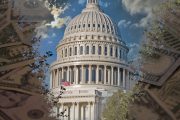
President Trump, who previously has used the power of his office to pardon such individuals as former Sheriff Joseph Arpaio, former advisor to Vice President Dick Cheney Lewis “Scooter” Libby, author and filmmaker Dinesh D’Souza; financier Michael Milken, and former National Security Advisor Michael Flynn, is being urged by several members of Congress, including Senator Rand Paul (R-Ky.) and Representative Matt Gaetz (R-Fla.) to pardon whistleblower Edward Snowden.
Snowden was charged by the Obama administration’s Justice Department with having violated the Espionage Act by sharing “unauthorized communication of national defense information” and “willful communication of classified communications intelligence information to an unauthorized person.”
As was noted in a report in The New American in September, Gaetz cited an opinion rendered by the Ninth Circuit Court of Appeals in early September that the National Security Agency (NSA) surveillance program Snowden exposed is illegal as justification for pardoning him.
“The government may have violated the Fourth Amendment and did violate the Foreign Intelligence Surveillance Act (“FISA”) when it collected the telephony metadata of millions of Americans,” the three-judge panel unanimously opined. As The New American observed, the Ninth Circuit Court opinion contained several references to Snowden.
{modulepos inner_text_ad}
Responding to news of the court’s opinion, Snowden tweeted: “Seven years ago, as the news declared I was being charged as a criminal for speaking the truth, I never imagined that I would live to see our courts condemn the NSA’s activities as unlawful and in the same ruling credit me for exposing them.”
The charges against Snowden were based on his actions back in 2013, when, as an employee at Booz Allen Hamilton — which Bloomberg called “the world’s most profitable spy organization” — he worked as a subcontractor for the NSA. During that tenure, Snowden leaked to the Washington Post and to the Guardian (U.K.) a cache of documents exposing the NSA’s wholesale violation of the Fourth Amendment through its widespread surveillance of phone records and its monitoring of Internet traffic.
Snowden made anonymous contact with Glenn Greenwald, a journalist working at the Guardian, on December 1, 2012. After Greenwald decided that the measures that Snowden asked him to take to secure their communications were too annoying to employ and declined, Snowden then contacted documentary filmmaker Laura Poitras in January 2013. Poitras said that Snowden chose to contact her after seeing her New York Times article about NSA whistleblower William Binney. However, Greenwald began working with Snowden in either February or April 2013, after Poitras asked Greenwald to meet her in New York City, at which point Snowden began providing documents to them.
In May 2013, Snowden gave an electronic interview to Poitras and journalist-hacker Jacob Appelbaum, which was published weeks later by the German magazine Der Spiegel.
Afterwards, Snowden promised that nothing would stop subsequent disclosures. In June 2013, he said, “All I can say right now is the U.S. government is not going to be able to cover this up by jailing or murdering me. Truth is coming, and it cannot be stopped.”
Within months, information supplied by Snowden was published by media outlets worldwide. In February 2014, for reporting based on information supplied by Snowden, journalists Greenwald, Poitras, Barton Gellman, and the Guardian’s Ewen MacAskill were honored by Long Island University as co-recipients of the 2013 George Polk Award for Journalism — which they dedicated to Snowden. The NSA reporting by these journalists also earned the Guardian and the Washington Post the 2014 Pulitzer Prize for Public Service.
On June 14, 2013, federal prosecutors filed a criminal complaint against Snowden, charging him with three felonies: theft of government property and two counts of violating the Espionage Act of 1917, and willful communication of classified communications intelligence information to an unauthorized person.
On June 22, 2014, 18 days after publication of Snowden’s NSA documents began, officials revoked his U.S. passport. Secretary of State John Kerry said that Snowden’s passport was cancelled “within two hours” of the charges against him being made public the previous day.
Several prominent political figures have supported Snowden’s efforts to expose unconstitutional surveillance methods. Former congressman Ron Paul (R-Texas) began a petition urging the Obama administration to grant Snowden clemency. Paul released a video on his website saying, “Edward Snowden sacrificed his livelihood, citizenship, and freedom by exposing the disturbing scope of the NSA’s worldwide spying program. Thanks to one man’s courageous actions, Americans know about the truly egregious ways their government is spying on them.”
Paul’s son, Senator Rand Paul (R-Ky.), has continued his father’s position in supporting Snowden, recently tweeting: “James Clapper brazenly lied to Congress denying that the Deep State was spying on all Americans. @Snowden simply revealed Clapper’s lies and exposed unconstitutional spying. He deserves a pardon from @realDonaldTrump!”
Paul’s referred to Clapper’s reply to a question by Senator Ron Wyden (D-Ore.) during a Senate Intelligence Committee Hearing. Senator Wyden asked, “Does NSA collect any type of data at all on millions or hundreds of millions of Americans?” Clapper responded, “No sir. Not wittingly.”
Representative Thomas Massie (R-Ky.) tweeted: “Now is the time to #pardonsnowden”
Former Republican congressman turned Libertarian, Representative Justin Amash, added his voice to his colleagues’ with his tweet: “Pardon @Snowden.”
Related articles:
Matt Gaetz Calls on President Trump to Pardon Snowden
Edward Snowden: Traitor or Hero?
President Trump Considering Pardoning Whistleblower Edward Snowden



